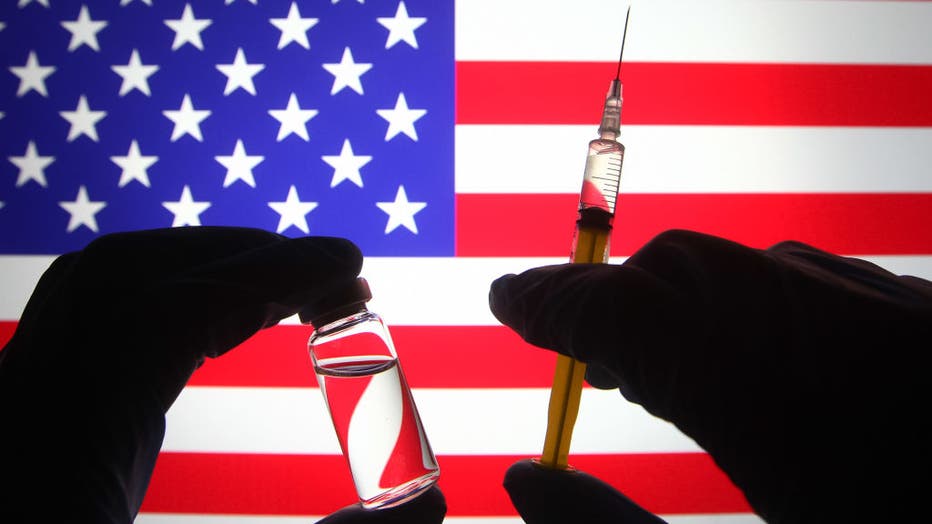Unvaccinated people account for 'virtually all' COVID-19 hospitalizations, deaths, White House says
WASHINGTON - COVID-19 cases continue to amass in parts of the United States and the White House said unvaccinated people are the most impacted.
At Thursday’s news briefing, Jeff Zients, the White House COVID-19 response coordinator, said "virtually all COVID-19 hospitalizations and deaths in the United States are now occurring among unvaccinated individuals."
According to data collected by the U.S. Centers and Disease Control and Prevention (CDC), 184 million Americans have gotten at least one dose of an FDA-authorized COVID-19 vaccine.
Zients applauded them for rolling up a sleeve and contributing to America's recovery from the pandemic — which has seen case numbers, hospitalizations and deaths plummet from the highs of last winter.
"As a country, we’re closer than ever to ending this pandemic and getting back to normal," Zients said. "But the sad reality is that, despite our progress, we’re still losing people to this virus — which is especially tragic given, at this point, it is unnecessary and preventable."
RELATED: Fauci: 99.2% of US COVID-19 deaths involved unvaccinated people
Dr. Anthony Fauci, the nation’s top infectious disease expert and President Joe Biden’s chief medical advisor, shared similar concerns last week.
He told NBC’s "Meet the Press" it’s frustrating "where you have a formidable enemy" in the coronavirus and "yet we do have a countermeasure that’s highly, highly effective. And that’s the reason why it’s all the more sad and all the more tragic why it isn’t being completely implemented in this country."
Zients said COVID deaths and hospitalizations among unvaccinated Americans is a trend that’ll likely continue, particularly due to the recent spread of the more transmissible delta variant.
Earlier this week, the CDC predicted that the delta variant has now become the dominant strain of COVID-19 in the U.S.
RELATED: Delta variant now most common COVID-19 strain, CDC prediction suggests
National genomic surveillance data showed the delta variant accounting for 30.4% of cases in the two-week period that ended on June 19. The CDC believes that will grow to 51.7% for the two-week period that ended July 3.
"And in some parts of the country, the percentage is even higher. For example, in parts of the Midwest and Upper Mountain states, CDC’s early sequence data suggests the Delta variant accounts for approximately 80 percent of cases," said Dr. Rochelle Walensky, director of the CDC, at Thursday’s briefing.
It’s still unclear if the delta variant is more deadly than other strains, but the CDC notes "increased transmissibility" with the delta variant and the potential for it to make certain monoclonal antibody treatments less effective. Even so, all three authorized shots are effective against the COVID variants — including the delta variant.
"The world is understandably worried about the delta virus variant," Dr. Anthony Fauci, the director of the U.S. National Institute of Allergy and Infectious Diseases, said. "The vaccines indeed are effective against it."
Fauci cited various studies, including three real-world studies which separately showed Pfizer was 79%, 88% and 96% effective against the delta variant.

In this photo illustration, a silhouette of hands in medical gloves hold a medical syringe and a vial in front of the US flag. (Photo Illustration by Pavlo Gonchar/SOPA Images/LightRocket via Getty Images)
But that promising news means little to those who are still refusing the shot. Zients said the COVID response team has plans to address that.
Officials are targeting older children by getting vaccines to pediatricians offices. The hope is to have the teens inoculated when they show up for back-to-school checkups or get physical examinations for sports.
They will also work to bring shots to school campuses and even to workplaces for unvaccinated adults.
"At the same time we work with communities to get more shots and arms, we’re also mobilizing COVID-19 surge response teams to provide additional support to states in dealing with outbreaks among the unvaccinated," Zients said.
This story was reported from Atlanta.

